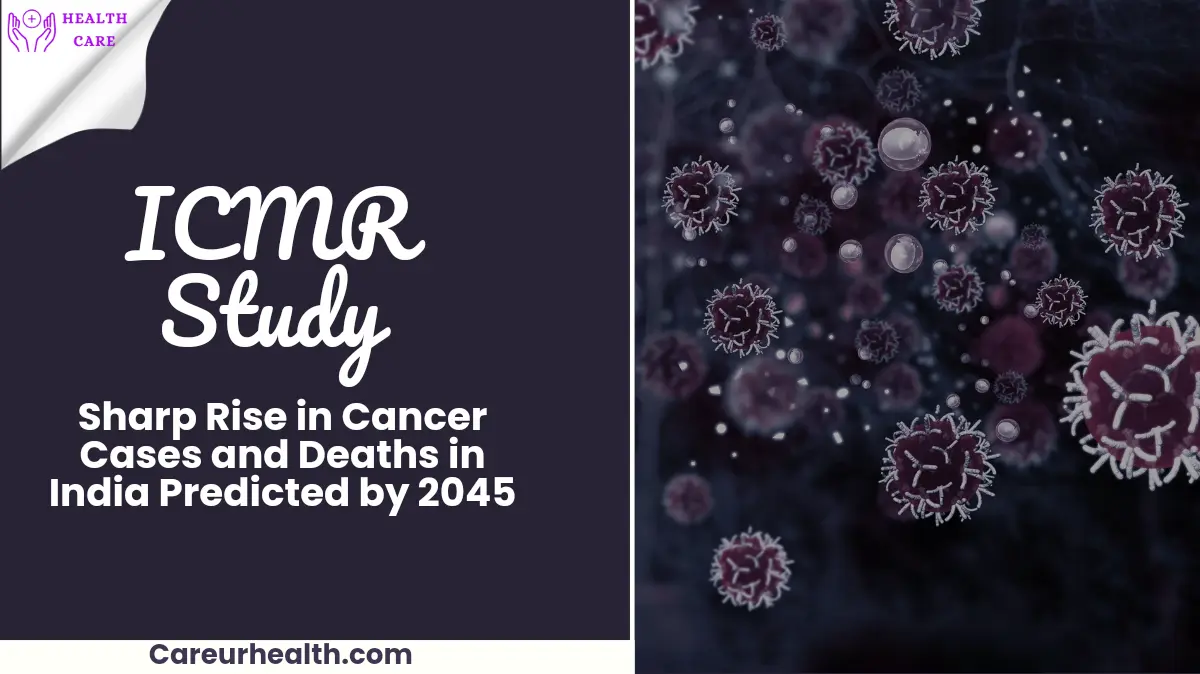Introduction to the Study
The Indian Council of Medical Research (ICMR) has recently released a comprehensive study indicating a sharp rise in cancer cases and deaths in India, projecting alarming statistics by 2045.
This study highlights the urgent need for intervention strategies to address this impending health crisis. Cancer deaths are rising across BRICS countries, posing a major public health challenge.
With cancer becoming a leading cause of death globally, India faces unique challenges due to its large population, varied lifestyles, and healthcare disparities. The ICMR findings reveal that India’s cancer rates are expected to rise significantly in the coming years.
Key Takeaways
- The ICMR study predicts a significant increase in cancer cases in India by 2045.
- The rise in cancer mortality rates is expected to strain the healthcare system.
- A comparison with BRICS countries reveals concerning trends across the region.
- Lifestyle changes and environmental factors are identified as major contributors.
- Early detection and preventive measures are essential for combating this impending crisis.
Understanding the Data
The ICMR’s research is based on extensive data collection, epidemiological studies, and predictive modeling. Cancer deaths are rising across BRICS countries, posing a major public health challenge.
Cancer cases in India are projected to significantly rising by 2045, highlighting an urgent need for enhanced prevention.
“The study suggests that the number of new cancer cases in India could reach approximately 2.5 million annually by 2045, along with an increase in cancer-related deaths. The findings not only emphasize the urgency of addressing cancer care in India but also stress the importance of early detection and effective treatment.”
Comparison with BRICS Countries
A comparative analysis within the BRICS nations reveals troubling patterns. While India is experiencing a steep rise in cancer cases, other countries like Brazil and South Africa face similar challenges. Cancer deaths are rising across BRICS countries, posing a major public health challenge.
Cancer cases in India are projected to significantly rising by 2045, highlighting an urgent need for enhanced prevention. The ICMR findings reveal that India’s cancer rates are expected to rise significantly in the coming years.
This comparison underlines the need for a collective effort among BRICS countries to tackle this growing public health issue effectively.
Factors Contributing to the Rise in Cancer Cases
Lifestyle Changes
One of the primary factors contributing to the rising cancer rates in India is the shift in lifestyle choices. Increased consumption of processed foods, sedentary behavior, and reduced physical activity have all been linked to higher cancer risks. Cancer cases in India are projected to significantly rising by 2045, highlighting an urgent need for enhanced prevention.
Moreover, tobacco use and alcohol consumption remain significant contributors to various cancers, particularly in urban areas.
Environmental Factors
Environmental factors also play a crucial role in the rising incidence of cancer. Exposure to pollutants, chemicals, and radiation has been linked to several types of cancer. Urbanization and industrialization have led to increased environmental hazards, making it essential to address these issues as part of a comprehensive cancer prevention strategy.
Genetic Predisposition
Genetics cannot be overlooked when discussing cancer risks. Family history and genetic predisposition can significantly impact an individual’s likelihood of developing cancer. The ICMR study emphasizes the need for genetic research to identify high-risk populations and tailor prevention strategies accordingly.
This analysis reveals alarming trends that highlight the urgent need for effective public health strategies. As cancer continues to be a leading cause of death globally, understanding its impact on the Indian population is crucial. The study indicates that without immediate intervention, the healthcare system will face unprecedented challenges.
Key Findings
The ICMR study predicts that cancer cases in India could rise dramatically, potentially reaching approximately 2.5 million annually by 2045. Cancer deaths are rising across BRICS countries, posing a major public health challenge.
Cancer cases in India are projected to significantly rising by 2045, highlighting an urgent need for enhanced prevention.
The study emphasizes several key factors contributing to this trend, including lifestyle choices, environmental exposure, and genetics. The causes of rising cancer cases in India include urbanization, lifestyle changes, pollution, and an aging population.
It also highlights the need for effective screening and prevention strategies to combat this impending crisis.
Bullet Points
- The rise in cancer cases is projected to exceed 2.5 million annually by 2045.
- Key factors include lifestyle changes and environmental exposure.
- Early detection and prevention strategies are crucial for success.
- The healthcare system may face unprecedented challenges without intervention.
- Collaboration with global organizations is necessary for effective response.
Lifestyle Factors Contributing to Cancer
Sedentary Lifestyle
One of the most significant contributors to the increasing cancer rates in India is the shift towards a more sedentary lifestyle. Cancer deaths are rising across BRICS countries, posing a major public health challenge.
Urbanization has led to a decline in physical activity, with many individuals opting for convenient transport as well as desk jobs. The causes of rising cancer cases in India include urbanization, lifestyle changes, pollution, and an aging population.
This lack of physical exercise is linked to various types of cancer, including breast and colon cancers. Encouraging regular physical activity is essential to mitigate these risks.
Dietary Changes
Dietary habits have also shifted significantly, with increased consumption of processed foods as well as sugary beverages. These dietary changes are correlated with higher rates of obesity, which is a major risk factor for several cancers.
Promoting a balanced diet rich in fruits, vegetables, and whole grains can help reduce cancer risks significantly. Public health campaigns focusing on nutrition can play a vital role in reversing these trends.
Bullet Points
- Sedentary lifestyles contribute significantly to cancer risks.
- Dietary changes include increased processed food consumption.
- Obesity is a major risk factor for various cancers.
- Regular physical activity is crucial for prevention.
- Public health campaigns can improve nutritional awareness.
Environmental Influences on Cancer Rates
Pollution and Cancer
Environmental factors significantly impact cancer rates in India. Urban areas often suffer from high levels of air and water pollution, which are linked to various cancers. Cancer predictions for BRICS nations indicate a substantial rise in cases and mortality rates in the coming decades.
Studies have shown that exposure to harmful chemicals can increase the risk of developing lung, skin, and other cancers. India cancer statistics for 2045 predict a sharp increase in cases and deaths.
Addressing environmental issues is vital for reducing cancer incidence in affected areas. Cancer cases in India are projected to significantly rising by 2045, highlighting an urgent need for enhanced prevention.
Agricultural Chemicals
The use of pesticides and chemicals in agriculture also poses a serious threat to public health. Farmers and agricultural workers are often exposed to toxic substances that can lead to higher cancer rates.
Implementing stricter regulations on chemical use as well as promoting organic farming practices can help protect vulnerable populations from these harmful exposures. Cancer predictions for BRICS nations indicate a substantial rise in cases and mortality rates in the coming decades.
Bullet Points
- Environmental factors, including pollution, significantly impact cancer rates.
- Urban areas face high levels of air and water pollution.
- Agricultural chemicals pose serious health risks.
- Stricter regulations on chemical use are necessary.
- Promoting organic farming can reduce toxic exposures.
The Role of Genetics in Cancer Risk
Genetic Predisposition
Genetics plays a critical role in the risk of developing cancer. Individuals with a family history of cancer are often at higher risk due to inherited genetic mutations. The ICMR report on cancer in India highlights a significant rise in cases, mortality rates by 2045.
India cancer statistics for 2045 predict a sharp increase in cases and deaths.
The ICMR cancer study spanning 2022-2045 projects a sharp rise in cancer cases
The ICMR study emphasizes the need for genetic testing and counseling for high-risk individuals to facilitate early detection and preventive measures. Understanding the hereditary components of cancer can lead to more personalized treatment options.
Advancements in Genetic Research
Recent advancements in genetic research have opened new avenues for cancer prevention and treatment. Cancer cases in India are projected to significantly rising by 2045, highlighting an urgent need for enhanced prevention.
Targeted therapies based on genetic profiling have shown promise in treating specific cancer types more effectively. The ICMR cancer study spanning 2022-2045 projects a sharp rise in cancer cases. Cancer predictions for BRICS nations indicate a substantial rise in cases and mortality rates in the coming decades.
Increasing awareness about the importance of genetic testing can empower individuals to take proactive steps toward managing their health.
Bullet Points
- Genetics significantly influence cancer risk.
- Individuals with family histories are at higher risk.
- Genetic testing can facilitate early detection.
- Targeted therapies show promise for specific cancers.
- Awareness of genetic testing empowers individuals.
It identifies cancer as a primary health challenge and attributes the rise to factors such as aging, urbanization, lifestyle changes, and environmental pollutants.
Cancer predictions for BRICS nations indicate a substantial rise in cases and mortality rates in the coming decades.
The study’s objective is to provide data-driven support for policymakers and healthcare providers to strategize cancer prevention, diagnosis, as well as treatment.
A particular focus is placed on reducing regional disparities in healthcare access, as some areas are more vulnerable to specific cancer types due to socioeconomic as well as geographic factors. India cancer statistics for 2045 predict a sharp increase in cases and deaths.
Key Findings
The report projects that by 2045, cancer cases may nearly double, with marked increases in lung, breast, cervical, and colorectal cancers. Additionally, cancer mortality rates are expected to rise, largely due to delays in diagnosis and limited access to advanced treatment in underserved regions.
The study advocates for preventive measures, such as tobacco control, HPV vaccination programs, and public awareness campaigns. It stresses the importance of strengthening infrastructure to support timely diagnosis and effective treatment to alleviate the anticipated health and economic impact.
Healthcare System Response to Rising Cancer Rates
Current Challenges
The Indian healthcare system faces several challenges in addressing the projected rise in cancer cases. Limited access to healthcare services, especially in rural areas, poses significant barriers to early diagnosis as well as treatment.
India cancer statistics for 2045 predict a sharp increase in cases and deaths. Common cancers in India include breast, lung, cervical, and colorectal cancers.
Many patients face long wait times and lack the necessary resources for adequate care. Strengthening the healthcare infrastructure is critical to meeting the needs of an increasingly burdened population.
Importance of Early Detection and Treatment
Early detection and timely treatment are essential for improving cancer survival rates. The ICMR study underscores the importance of regular screening programs and public health initiatives aimed at raising awareness about cancer symptoms.
The ICMR cancer study spanning from 2022-2045 projects a sharp rise in cancer cases
By encouraging individuals to seek medical attention promptly, the healthcare system can improve outcomes and reduce cancer mortality rates.
Bullet Points
- The healthcare system faces significant challenges.
- Limited access to services hampers early diagnosis.
- Strengthening healthcare infrastructure is critical.
- Early detection improves cancer survival rates.
- Public health initiatives raise awareness about cancer.
The ICMR study serves as an urgent reminder of the rising cancer cases and deaths predicted for India by 2045. India cancer statistics for 2045 predict a sharp increase in cases and deaths. Common cancers in India include breast, lung, cervical, as well as colorectal cancers.
With changing lifestyles, environmental challenges, and an underprepared healthcare system, immediate action is essential.
By prioritizing prevention, early detection, and healthcare infrastructure, India can mitigate the impending cancer crisis. Collaborative efforts, both nationally and internationally, are vital to addressing this pressing health issue.
The Healthcare System’s Response
Current Challenges
The Indian healthcare system faces several challenges in addressing the anticipated rise in cancer cases. Limited access to healthcare facilities, especially in rural areas, poses significant barriers to early diagnosis and treatment.
Moreover, the existing healthcare infrastructure is not adequately equipped to handle the projected increase in patient volume.
Importance of Early Detection
Early detection is critical in improving cancer survival rates. The ICMR cancer study spanning 2022-2045 project a rise in cancer cases
Bullet Points
- The ICMR study highlights the urgent need for action.
- Changing lifestyles and environmental challenges must be addressed.
- Early detection and prevention are critical for mitigation.
- Collaborative efforts are vital for effective response.
- Addressing the cancer crisis requires a comprehensive approach.
By promoting awareness and education, the healthcare system can empower individuals to seek help promptly.
Government Initiatives
The Indian government has initiated several programs aimed at cancer prevention and control. However, the scale of the problem requires enhanced funding as well as resources. India cancer statistics for 2045 predict a sharp increase in cases and deaths.
Collaborations with international organizations and non-profits can bolster these efforts, leading to more effective strategies for cancer care. The ICMR findings reveal that India’s cancer rates are expected to rise significantly in the coming years.
Conclusion
The ICMR study serves as a wake-up call regarding the alarming rise in cancer cases and deaths predicted in India by 2045. The ICMR cancer study spanning 2022-2045 projects a sharp rise in cancer.
With changing lifestyles, environmental challenges, and an underprepared healthcare system, immediate action is essential. The ICMR findings reveal that India’s cancer rates are expected to rise significantly in the coming years.
By focusing on prevention, early detection, as well as strengthening the healthcare infrastructure, India can mitigate the impending cancer crisis. The need for collective action, both nationally and internationally, is crucial in addressing this pressing health issue.
FAQs
1. What is the projected number of cancer cases in India by 2045?
The ICMR study projects that new cancer cases in India could reach approximately 2.5 million annually by 2045. The ICMR report on cancer in India highlights a significant rise in cases and mortality rates by 2045.
2. What factors contribute to the rise in cancer cases?
Lifestyle changes, environmental factors, and genetic predisposition are key contributors to the increasing cancer rates.
3. How does India’s cancer incidence compare to other BRICS countries?
India faces a steep rise in cancer cases similar to trends observed in other BRICS countries like Brazil and South Africa.
4. What role does early detection play in cancer treatment?
Early detection significantly improves survival rates and emphasizes the importance of regular screening and public awareness. The ICMR report on cancer in India highlights a significant rise in cases and mortality rates by 2045.
5. What initiatives has the Indian government implemented to combat cancer?
The Indian government has initiated several cancer prevention and control programs, though increased funding and resources are needed to enhance their effectiveness.










